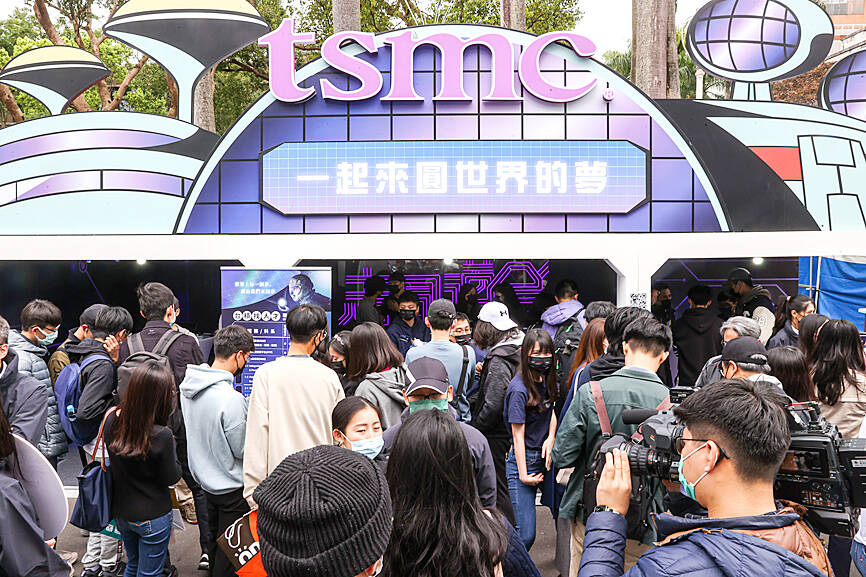Taiwan Semiconductor Manufacturing Co’s (TSMC, 台積電) revenue from its biggest customer last year rose 30.64 percent from the previous year, financial data released by the company on Friday showed.
While the world’s largest contract chipmaker did not identify the customer, it was widely believed to be Apple Inc.
TSMC’s revenue from the customer totaled about NT$529.65 billion (US$17.32 billion) last year, the data showed.

Photo: CNA
It was the first time a single customer contributed more than NT$500 billion to TSMC’s annual revenue.
However, the revenue generated by the customer accounted for 23 percent of TSMC’s total sales, down from 26 percent in 2021.
The chipmaker’s second-largest customer in terms of sales, thought to be US chip designer Advanced Micro Devices Inc (AMD), also saw its contribution fall below 10 percent of TSMC’s total sales, but no further details were released.
Analysts said TSMC’s automotive chip sales last year rose 74 percent from 2021, beating the 59 percent and 28 percent growth in sales of chips used in high-performance computing devices and smartphones respectively, which explains the declines in Apple and AMD’s contributions to TSMC’s sales.
TSMC’s biggest source of revenue last year was the US market, which accounted for 65.96 percent of its total sales at NT$1.49 trillion.
It was followed by China (10.82 percent) at NT$245.17 billion, Taiwan (9.29 percent) at NT$210.47 billion and Japan (5.26 percent) at NT$119.099 billion.
TSMC last year posted a net profit of more than NT$1 trillion for the first time in its history, with net income rising 70.4 percent to NT$1.01 trillion, and earnings per share growing from NT$23.01 to NT$39.2.

CHIP WAR: Tariffs on Taiwanese chips would prompt companies to move their factories, but not necessarily to the US, unleashing a ‘global cross-sector tariff war’ US President Donald Trump would “shoot himself in the foot” if he follows through on his recent pledge to impose higher tariffs on Taiwanese and other foreign semiconductors entering the US, analysts said. Trump’s plans to raise tariffs on chips manufactured in Taiwan to as high as 100 percent would backfire, macroeconomist Henry Wu (吳嘉隆) said. He would “shoot himself in the foot,” Wu said on Saturday, as such economic measures would lead Taiwanese chip suppliers to pass on additional costs to their US clients and consumers, and ultimately cause another wave of inflation. Trump has claimed that Taiwan took up to

A start-up in Mexico is trying to help get a handle on one coastal city’s plastic waste problem by converting it into gasoline, diesel and other fuels. With less than 10 percent of the world’s plastics being recycled, Petgas’ idea is that rather than letting discarded plastic become waste, it can become productive again as fuel. Petgas developed a machine in the port city of Boca del Rio that uses pyrolysis, a thermodynamic process that heats plastics in the absence of oxygen, breaking it down to produce gasoline, diesel, kerosene, paraffin and coke. Petgas chief technology officer Carlos Parraguirre Diaz said that in

SUPPORT: The government said it would help firms deal with supply disruptions, after Trump signed orders imposing tariffs of 25 percent on imports from Canada and Mexico The government pledged to help companies with operations in Mexico, such as iPhone assembler Hon Hai Precision Industry Co (鴻海精密), also known as Foxconn Technology Group (富士康科技集團), shift production lines and investment if needed to deal with higher US tariffs. The Ministry of Economic Affairs yesterday announced measures to help local firms cope with the US tariff increases on Canada, Mexico, China and other potential areas. The ministry said that it would establish an investment and trade service center in the US to help Taiwanese firms assess the investment environment in different US states, plan supply chain relocation strategies and

Japan intends to closely monitor the impact on its currency of US President Donald Trump’s new tariffs and is worried about the international fallout from the trade imposts, Japanese Minister of Finance Katsunobu Kato said. “We need to carefully see how the exchange rate and other factors will be affected and what form US monetary policy will take in the future,” Kato said yesterday in an interview with Fuji Television. Japan is very concerned about how the tariffs might impact the global economy, he added. Kato spoke as nations and firms brace for potential repercussions after Trump unleashed the first salvo of